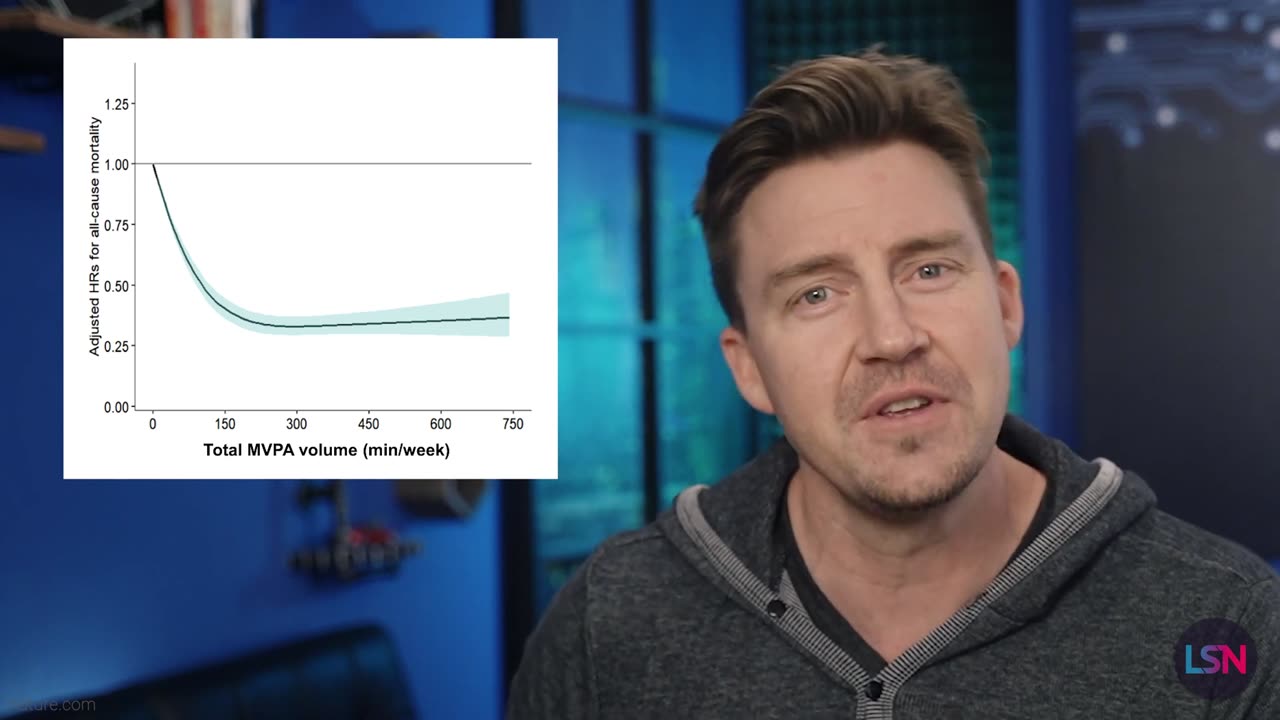Premium Only Content

Is This the Best Time to Exercise? What the Science Says.
Today we’re talking about a new study published in Nature Communications about exercise and all cause mortality. Everyone wants to know "What is the Best Time to Exercise?". Here's what the science says. In the study, the correlation of not dying and exercise grew stronger from 0 to 150 minutes of exercise a week and plateaued at around 200 minutes per week. This was true for all three types of mortality considered: all-cause, cardiovascular, and cancer. Exercise improved your chances of not dying from cardiovascular issues by 4x.
The study mainly looked at MVPA, or moderate to vigorous physical activity, at certain times of day. The finding was that people who had the bulk of their MVPA either in the morning or in the evening didn’t get as much of a benefit as those who exercised mostly during midday-afternoon or mixed hours. Even in models adjusted for age, sex, ethnicity, socioeconomic status, education level, diet, smoking, alcohol intake, sleep quality, and total exercise volume, the midday-afternoon and mixed hours groups showed a whopping 28% and 26% more of a reduction in cardiovascular mortality compared to the morning group.
The researchers mentioned circadian rhythms might affect recovery and that previous studies showed faster recovery of systolic blood pressure after exercise in the late afternoon than in the early morning. Exercising at certain times of the day might be more effective for certain people, especially those with existing cardiovascular conditions. So again for my fellow morning workout people I have to express that, that’s annoying.
However, this was a populational study, so we can’t establish causation and who knows how many confounding variables are mucking up the data. It also has design limitations, such as they only wore the accelerometers for a week. But the results were pretty significant so it does suggest the time of exercise could be important.
So, when do you exercise, and why? What have your experiences been? Let us know in the comments below. Make sure to subscribe and click the bell so you can stay up to date on aging research.
-
![GRAY ZONE DEVLOG FOR .3.5 UPDATE!!! [RGMT CONTENT Mgr. | RGMT GL | GZW CL]](https://1a-1791.com/video/fww1/11/s8/1/0/K/B/w/0KBwz.0kob-small-GRAY-ZONE-DEVLOG-FOR-.3.5-U.jpg) LIVE
LIVE
XDDX_HiTower
35 minutes agoGRAY ZONE DEVLOG FOR .3.5 UPDATE!!! [RGMT CONTENT Mgr. | RGMT GL | GZW CL]
58 watching -
 LIVE
LIVE
LFA TV
15 hours agoLIVE & BREAKING NEWS! | TUESDAY 11/4/25
3,981 watching -
 LIVE
LIVE
The Shannon Joy Show
1 hour agoICE Brutality In Evanston, Illinois Sparks New Outrage * GOP Seeks New FISA Re-Authorization * Are Tucker Carlson & Nick Fuentes Feds?
265 watching -
 LIVE
LIVE
The Mel K Show
1 hour agoA Republic if You Can Keep It-Americans Must Choose 11-04-25
558 watching -
 LIVE
LIVE
Grant Stinchfield
1 hour agoThe Mind Meltdown: Are COVID Shots Fueling America’s Cognitive Collapse?
142 watching -
 1:00:46
1:00:46
VINCE
4 hours agoThe Proof Is In The Emails | Episode 161 - 11/04/25
146K115 -
 2:12:22
2:12:22
Benny Johnson
3 hours ago🚨Trump Releases ALL Evidence Against James Comey in Nuclear Legal BOMBSHELL! It's DARK, US in SHOCK
77.7K26 -
 2:04:05
2:04:05
Badlands Media
11 hours agoBadlands Daily: November 4, 2025
58.6K8 -
 2:59:49
2:59:49
Wendy Bell Radio
7 hours agoBUSTED.
71.6K83 -
 1:15:01
1:15:01
The Big Mig™
4 hours agoDing Dong The Wicked Witch Pelosi Is Gone
12.3K6